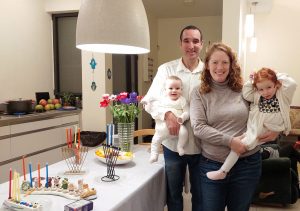If you ask an adult Israeli what is the reason for celebrating Hanukkah, 9 out 0f 10 will answer that the miracle of the oil can which lasted for 8 days is the cause of the holiday . However, this is not the true historical reason. So why do most Israelis stick with this “kindergarten version” and are less aware of the actual reason?
This article will focus on the Jewish holiday of Hanukkah. In December 2025, the newsletter will discuss December holidays, specifically Christmas.
Is it a coincidence, or do both Christmas and Hanukkah share common pagan roots?
The answer is likely yes, and it relates to the end of the agricultural season and humankind’s fear of darkness, which stemmed from not understanding the laws of nature.
The shortest day of the year occurs annually on December 21st (in ancient times, on December 25th). Up to this date, the days shorten, but from this point onward, the days begin to lengthen again. Since in ancient times people feared darkness and loved light, they celebrated this event—essentially marking that the world was not ending, and neither were they.
The Canaanites were the first, and their traditions spread to the Greeks and Romans, who advanced the holiday into the winter festival held from December 17–26, known as Saturnalia, honoring Saturn, the god of the harvest (eight days’ length of celebrations ). Another celebration, Kalenda, began in early January (also lasting eight days). On top of this pagan festival, two new holidays emerged in Judaism and Christianity.
In Judaism, The Maccabean revolt against the Hellenists (not the Greeks) took place in the 2nd century BCE (136–132 BCE). Since the fighters didn’t have time to celebrate the important holiday of Sukkot—which symbolized salvation—they celebrated “Sukkot” as soon as the revolt ended. That’s why both Sukkot and Hanukkah last for eight days.
The name of Hanukka comes from the Hebrew word “Hanu” which means – “they camped” on the 25th of the Jewish month of Kislev. The holiday was instituted by Judah Maccabee and his brothers to purify the Temple and renew sacrificial worship. In the Books of the Maccabees (First and Second), written close to the events of the revolt (2nd century BCE), the miracle of the oil can is not mentioned at all. The miracle is only mentioned in the Third and Fourth Books of the Maccabees, written in the 1st century BCE. It’s important to note that the olive harvest season also ends around this time. What a coincidence—this Festival of Lights coincides with an agricultural season.
In Israel and the United States, Hanukkah is the 4th most important holiday after Rosh Hashanah, Yom Kippur, and Passover, even though it is not biblical. In Israel, the early Zionists emphasized the holiday’s national significance. This marked the last time Jews were politically independent—a goal that aligned with the Zionist aspiration to establish a free Jewish state. Moreover , it became a beloved children’s holiday, with meaningful content developed for kids.
In the U.S., Christmas is celebrated by all, leaving Jews with not much 😣. in accordance with this Christmas competition, Hanukkah became an extremely significant holiday. Additionally, Hanukkah’s focus on religious freedom resonates deeply in America, as religious freedom is a core value on which the U.S. was founded. In some Jewish families, eight gifts are given to children—one for each day of Hanukkah. In Israel, one gift is enough. During Hanukkah, we light a Hanukkiah, not a Menorah.
In conclusion, Hanukkah is a blend of historical events (the revolt and the rededication of the altar), the legend of the oil can miracle, a celebration marking the end of the agricultural season, and Jewish narratives tied to their geographic locations.
So, to the question of why most adult Israelis hold onto the “kindergarten version”—perhaps it’s because childhood education leaves a strong impression on us, especially when Judaism is perceived as something you are naturally born into and taken for granted.
Happy December holidays to my Jewish and Christian friends.
We’re waiting for a modern-day Hanukkah miracle with the return of all our hostages.
I hope to stay in touch and see you soon in Israel or the U.S. If you have family or friends planning a trip to Israel, I’d appreciate your recommendation of me as a guide.
Happy Holidays.
in the photo, Wald-Rozencwajg family lighting the Chanukia: Orli, Carmel (+3) and Yuval (7 months old).

